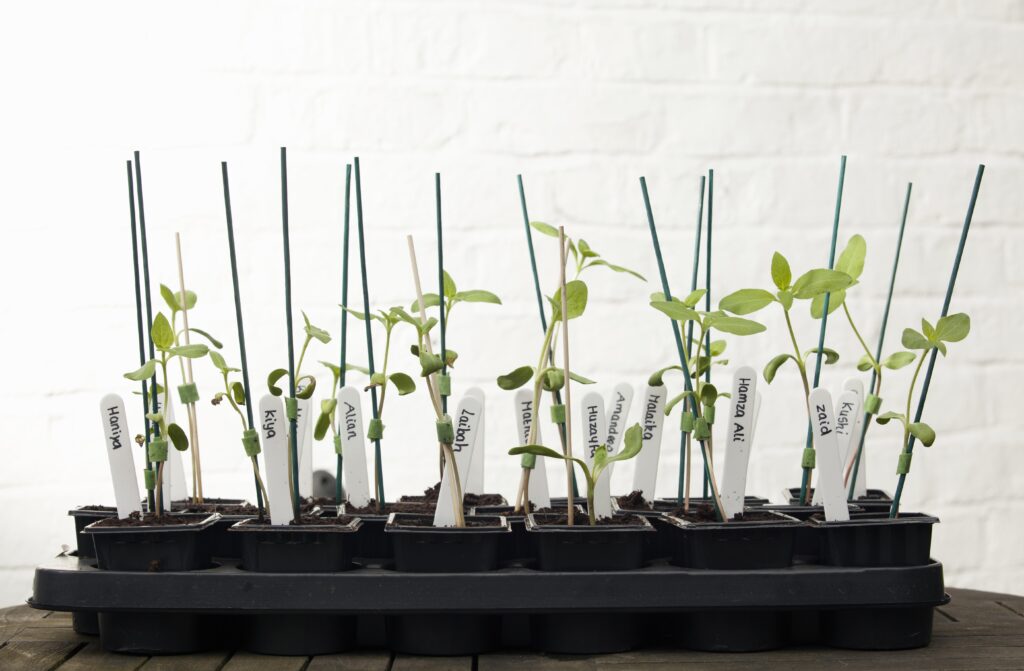Yes, Sunflowers can grow in clay soil. But they may not get as much water and nutrients as they would in other types of soil. Clay soil is very dense and compact, so it doesn’t aerate well. Sunflowers do best in well-drained soils that have plenty of humus.
Can sunflowers grow in clay soil?

If you plant sunflowers in clay soil, make sure to aerate the soil before planting and provide a consistent water supply. Sunflowers need lots of sunlight to grow well, so make sure to plant them in an area that gets plenty of sun. They also need well-drained soil, so be sure to amend your soil as needed before planting.
Clay soil is very dense and does not allow for proper drainage. Sunflowers require well-drained soil in order to grow and thrive. If you have clay soil, it is best to amend it with organic matter such as compost or peat moss.
When to plant sunflowers?

Sunflowers can be planted in early spring, after the last frost date for your area. Be sure to check your local frost dates before planting.
How to Plant Sunflowers?
You can grow sunflowers from seed or buy plants from a nursery. If you are growing from seed, soak the seeds overnight in water before planting them. This will help them germinate faster and improve their chances of success.
Plant the sunflower seeds about one inch deep in well-drained soil. Space the seeds about 12 inches apart so they have room to grow. Water the seeds well after planting.
If you are growing sunflower plants from a nursery, plant them at the same depth they are currently growing at and space them about 12 inches apart. Water them well after planting.
Sunflower Care Tips
Sunflowers are one of the most beautiful and cheerful flowers that you can grow in your garden. They are also quite easy to care for, as long as you keep a few basic tips in mind.
First of all, choose a sunny spot in your garden for your sunflowers. They need at least six hours of sunlight per day in order to grow well.
Secondly, make sure to water your sunflowers regularly. They are quite drought-tolerant, but will do best if they receive around an inch of water per week.
Finally, don’t forget to deadhead your sunflowers regularly. This means removing the spent flowers from the plant so that it can focus its energy on producing new blooms.
Which Soil is Best for Sunflowers?

Sunflowers are one of the most popular flowers in the world and they are relatively easy to grow. The key to growing sunflowers is to choose the right type of soil. Sandy soil is the best type of soil for sunflowers.
Sunflowers thrive in sandy soil because it is alkaline and has a lot of nutrients. Sandy soil is also easy to cultivate and does not require a lot of fertilizer. If you want to grow sunflowers in a different type of soil, you can add some compost or loam soil to make it more alkaline.
How Deep Should the Soil be for Sunflowers?
Sunflowers need deep, well-drained soil to grow. Sunflowers need loam soil with a slightly acidic to alkaline pH of 6 to 7.5.
The taproot system of sunflowers penetrates deeply into the ground, so it is important to till the soil several inches deep before planting. In garden beds, loam soil is ideal for sunflowers. This type of soil allows the taproots to penetrate easily and also retains moisture well.
When planting sunflower seeds directly into the ground, sow them 2 inches deep and space the seeds 3 feet apart. Several varieties of sunflowers can grow and bloom in a single season. Once the plants are established, they will produce an abundance of seeds that can be harvested and enjoyed throughout the summer months.
How Often Should I Water Sunflowers?
Assuming you have planted your sunflowers in soil, you will need to water them regularly. The amount of water your sunflowers need will depend on the type of soil you have, as well as the weather conditions.
In general, you should water your sunflowers 2 to 3 inches per week. If the soil is dry, you may need to water more frequently. If the soil is mulched, you may need to water less often. You should also be aware of your local water supply and any restrictions that may be in place.
When watering, be sure to soak the entire root system, including the taproot. Allow the top inch or so of soil to dry out between watering. This will help discourage weeds from growing in your garden.
Are Sunflowers Good for the Soil?

Sunflowers are good for the soil because they help to enrich it and prevent soil erosion. They also help to control weeds and provide nutrients and water for the plants.
Sunflowers are also a beautiful addition to any bouquet. The edible seeds of the sunflower are a nutritious snack. Planting sunflowers is a great way to improve the health of your soil.
How Long Do Sunflowers Take To Grow?
Sunflowers are annual plants that complete their life cycle in one year. They grow quickly and can reach heights of up to 3 meters. Sunflowers need full sun and well-drained soil to grow well. Most varieties will mature and produce seeds within 60 days after planting.
How Tall Can Sunflowers Grow?
Sunflowers are one of the most popular flowers in gardens. They are easy to grow and their large flowers make them a focal point in any garden.
Sunflowers grow best in full sun and will reach their full height in about 6-8 weeks. Most sunflowers will grow to be about 2-3 feet tall, but some varieties can grow up to 6 feet tall! Sunflower seeds are a great source of food for birds and other wildlife.
The best soil for sunflowers
The best soil for sunflowers is a sandy loam soil. Sunflowers grow best in sandy soils that are alkaline. The best soil for sunflowers is a sandy loam soil. Sunflowers grow best in sandy soils that are alkaline. Loam soils are made up of sand, silt, and clay particles and have good drainage and water retention properties.
Sandy soils have good drainage but low water retention. Alkaline soils have a high pH level and are rich in nutrients. Manure and fertilizer can be added to improve the quality of the soil. Planting sunflower seedlings in the best soil will help them grow into strong and healthy plants.
Planting And Caring For Sunflowers
Sunflowers are one of the easiest flowers to grow and make a great addition to any garden. They are relatively drought-tolerant and can be grown in a variety of soil types, as long as the soil is well-drained and fertile. Sunflowers prefer full sun and should be planted in an area that receives at least six hours of direct sunlight per day.
To plant sunflower seeds, sow them directly into the ground in late spring or early summer. Space the seeds about 12 inches apart, as they will need room to grow. Once the seedlings emerge, thin them out so that only the strongest plants remain.
Water sunflowers regularly, especially during dry periods. Be sure to wait until the soil is dry before watering, as sunflowers are susceptible to root rot. Fertilize sunflowers every few weeks with a balanced fertilizer to encourage healthy growth.
